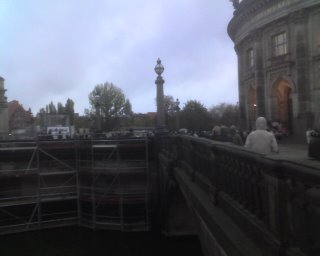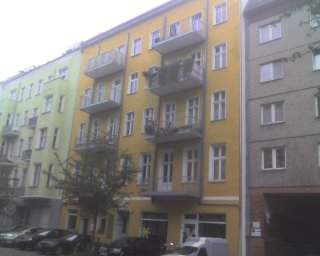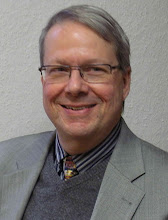
Yesterday I looked at 4 Berlin apartments with a real estate agent, who is one of the few people I have seen here who drives a car with an automatic shift, though I think they are becomning more common.
The first place was in a rennovated older building on the 2nd floor (3rd floor US). The entry way had lovely plaster reliefs, and there was turn-of-the-century detail on many of the doors. The apartment had interestingly irregularly shaped rooms, a pleasant balcony, and high ceilings, except in the hallway, where the previous owners had build an ugly low ceiling with a storage area above it. The kitchen had also been stripped of every cupboard and appliance. Only the sink remained, and a very aged sink at that. The bathroom also had a window that opened to the kitchen. On reflection I can imagine that the mix of smells might not be ideal.
The second place was a 5th floor walk-up apartment with two levels inside. We would be very healthy if we bought it, but I can also imagine the stairs being a burden in 20 years when we are in our mid 70s. The kitchen was good, complete with stone countertops, which I like. The internal second story was a bit like the upper part of some US Cape Cod houses: very open.
The third place was a handsome le Corbusier building.

One balcony looks out toward Berlin, the other looks west and more or less over the Grünewald (which is more south than west). The whole area is protected as a reserve, so nothing can spoil the view. The inside of the apartment is unusual. Basically there is a hall only every two floors and most apartments are two story inside. You enter this one in the small space, which is the kitchen (totally modern and wonderful) and the dining room, whose view is to the east over Berlin. Downstairs is the bedroom with a balcony facing east. It is not enormous, but has plenty of room for a big double bed. There are built in bookshelves, build in drawers, build-in walk-in closets (along the hall), and lovely bathroom, a wide hall, and at the other end a generous living room with more build-in shelves and a balcony facing west. The doors all slide, and they are not like US sliding doors- When closed, they look like walls.
Negatives: it is out at Olympia Stadium where drunk football (ie soccer) players roam, and the long long hallway wastes space (or would if so much were not turned into storage). Positives: The building had all the infrastructure redone a few years ago and the apartment is pristine beyond belief. Everything is top quality and furniture needs would be limited because of all the built-in stuff. The owner remodeled with the intent to make the apartment fit the style of the building, but I think he may have improved on it. It has an elevator. There is a little store in the building that sells Brötchen, eggs, etc. The S-Bahn is only 5 minutes away, with a driect train to the stop near the university. The trip takes about 22 minutes and trains run about every 10 minutes.
The last place was a roof-top apartment in a building still being rennovated. It will have an elevator, which is good. Trouble is, the work was so incomplete that there were not even walls up. A similar model apartment was not open when we were there.

















